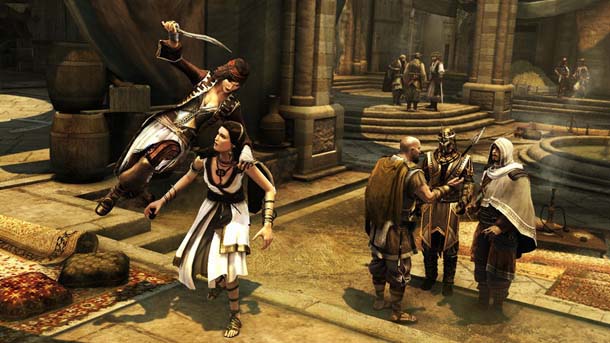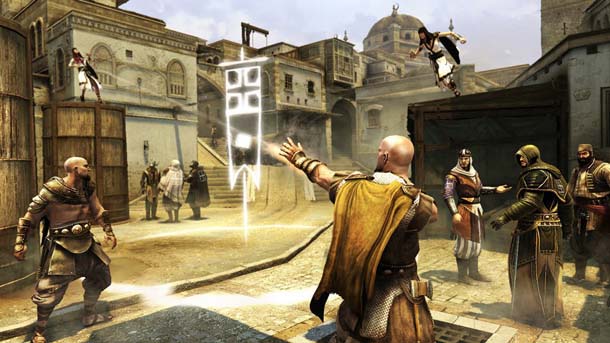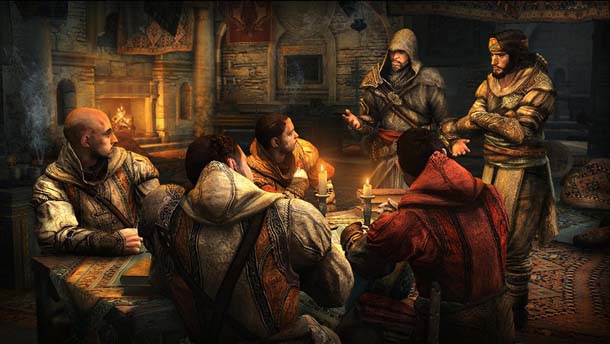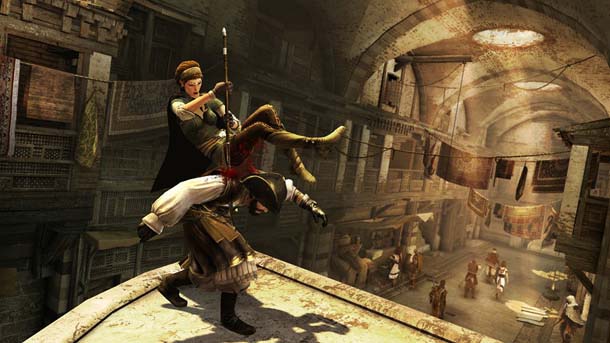The latest installment of the Assassin’s Creed series suffers from a desperate attempt at continuing the innovation the previous installments managed to do quite well. It feels like a game stuck between a rock and a hard place; being an annualized series it will either suffer criticisms from not changing the formula enough, or in this case from changing it too much.

That isn’t to say the formula has been completely changed. You’re still mostly playing as Ezio Auditore da Firenze, the master assassin who has been the focus of the previous two games. You’re still traversing the width and breadth of a sprawling open city, this time the multicultural Constantinople. You’re still occasionally interacting with famous historical figures, most notably a young Suleiman during this new adventure. You’re still balancing assassinations against attempting to keep your notoriety down to avoid Templar notice.
The staples of Assassin’s Creed are there. The issues start to show up when you really delve deeper into the experience. In addition to purchasing properties across Constantinople you now acquire Assassin’s Dens. These dens are Revelations’ version of Borgia Towers, in that you assassinate their specific Templar Captain and claim it for the Assassins Guild. They offer access to the new bomb crafting stations as well as allow you to send your recruited assassins on non-interactive missions to other cities across the Mediterranean, much like in Assassin’s Creed: Brotherhood. Perhaps most importantly they allow you to engage in missions with the assassin posted there which in turn helps that recruit become a Master Assassin, locking that building down and protecting it from Templar attacks.
The need to lock a building down is the first of what could have been potentially neat mechanics that almost all feel far too out of place. This one is a package deal; you let your Templar awareness get too high and instead of simply fighting you on sight the Templars will actively fight to retake their towers. The first part of this is congruous with the core experience, where you have to either assassinate or sneak your way to the entrance of the besieged Den. Once there, it begins a tower defense like mini-game which has you utilizing a bevy of various assassins and barricades to stave off waves of Templar attackers.

This tower defense mini-game is arguably the most jarring aspect of Revelations. If you fail to keep your notoriety down this mini-game will happen several times over the story, and it can either be one of the most frustrating or boring experiences, depending on how it’s handled. It isn’t particularly bad, though. It’s just not particularly good, either, and doesn’t mesh with the rest of the game.
The other new feature Revelations brings to the table is the story unfolding while playing as Desmond. Existing entirely inside the Animus on a digital construct known as Animus Island, Desmond can unlock a series of memory fragments of his own through collecting items while playing as Ezio. Once these memory fragments are available they take place as a series of first person platforming exercises, while Desmond vaguely recounts the story of his life. Like the tower defense bits these are incongruous at best or incredibly off putting at worst.
The story itself is fine. It works to flesh out Desmond as a character in this universe; something which has been sorely lacking from previous installments. Yes, previous games had sections with Desmond, but they worked towards developing the character from the points you play as him on. These story segments do an excellent job of giving him a personality. The platforming itself, however, is superfluous and frustrating. It provides you with a selection of shapes you can place in order to create paths for Desmond to navigate gaps, while removing any ability to move at a reasonable pace. You move at a steady speed the entire way, somewhere between a normal walking speed and a light jog.
These two segments are the crux of Revelations’ most serious issues. It isn’t that they’re especially broken; they just don’t feel at home in an Assassin’s Creed title.
Less problematic, though still something to be considered is the story. It is exactly what you think it should be, and the issue there is that the ending of Brotherhood sets up far, far more than is delivered in Revelations. Worse, the things you need closure with going into this new title are seemingly brushed away without a second thought. Where Desmond and his related cast should be the focus of the story with whatever ancestral assassin’s memories he is reliving a tool of moving that story forward, instead those memories are the entire point of this game, and Desmond’s story has become almost an afterthought.
Without moving into spoiling the actual plot of Revelations, it is enough to say that from beginning to end this game winds up being a zero sum story. It begins with a new quest, it finishes at the conclusion of that quest, and that’s it. In terms of the information gleaned by Desmond through the reliving of these particular memories it seems like a massive waste of time for the present day crew.

Still, not everyone comes to a video game for the story. Some people can pick up a game in a series they’ve never played before and jump right in, assuming it plays well and is an overall enjoyable experience.
Assassin’s Creed: Revelations works well enough. The mix of free running, parkour, and assassinations is as enjoyable now as it has ever been. The new gadgets Ezio becomes outfitted with do their job to make running around as painless as possible, and Constantinople is as full of interesting historical monuments and attractions as it is resplendent in the trappings of a vastly multicultural society. The multiplayer is still as addicting as it is cerebral.
Is this game something that must be played? Sure. Fans of the series will want it for the story. Fans of the multiplayer can have as much fun stabbing, shooting, chasing, and poisoning their friends as they did in Brotherhood. Newcomers can get as much fun out of both online and offline play as any seasoned player. But is it a game that must be played immediately? No. It’s there for when you have some free time, but just doesn’t quite stand up to previous installments.
This review is based on a copy of the game purchased by SideQuesting



1 Comment